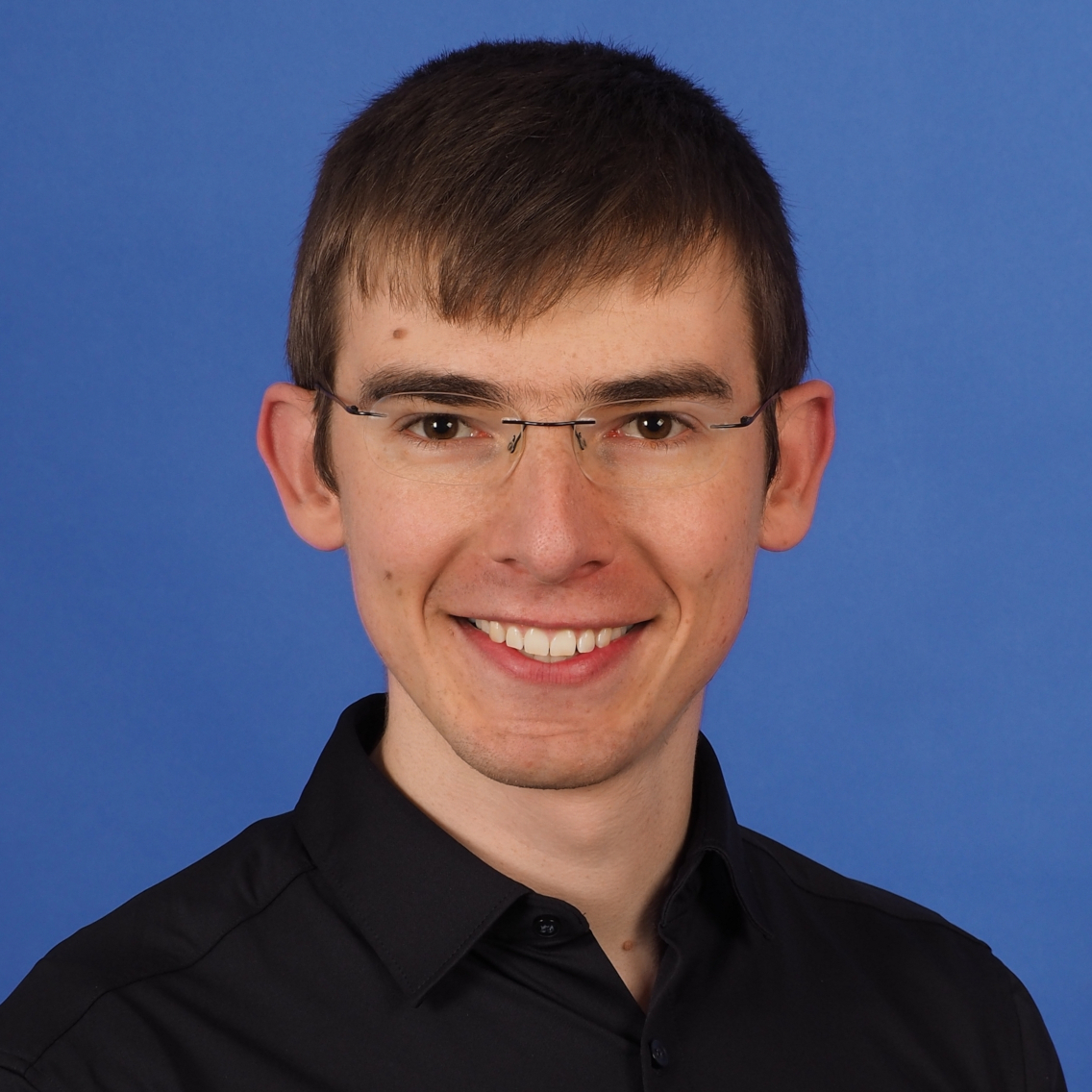Chair for Scientific Computing
University of Kaiserslautern-Landau (RPTU)
Paul-Ehrlich-Straße 34
67663 Kaiserslautern, Germany
Email: max.aehle@scicomp.uni-kl.de

Research Interests (as of March 2025)
My current main focus is the machine code based automatic differentiation tool Derivgrind, which I have implemented using the dynamic binary instrumentation framework Valgrind. This novel approach allows to differentiate cross-language and partially closed-source computer programs with little manual intervention. Specifically, I am motivated by the goal to provide derivatives of realistic Monte-Carlo particle simulators like Geant4 for the detector optimization undertaking of the MODE collaboration.
Besides, I develop proton computed tomography software for the Bergen pCT/SIVERT project and assist in teaching the scientific computing lecture. Previously, I have worked on the modelling of porous materials in the computational fluid dynamics suite SU2.
Talks
- Quantification and Visualization of Uncertainties in CT Reconstruction (with Viktor Leonhardt), 7th Annual Loma Linda Workshop, 03.08.2021, virtual, website
- How to use the Python/C API, SIVERT “Nice Tools” Colloquium, 20.09.2021, virtual
- Debugging C++ Code with GDB and Valgrind, SIVERT “Nice Tools” Colloquium, 25.04.2022, virtual
- Introduction to Tomographic RSP Reconstruction and Review of Existing Straight-Ray CT Codes and Architecture of a New Proton CT Code, Workshop “Recent Developments in Proton Computed Tomography”, 09.06.2022, Bergen, Norway
- Design of a Modular CT Reconstruction Framework, 8th Annual Loma Linda Workshop, 18.07.2022, virtual, website
- Towards Algorithmic Differentiation of GATE/Geant4, Second MODE Workshop on Differentiable Programming for Experiment Design, 13.09.2022, Colymbari, Greece, website
- Forward-Mode Automatic Differentiation of Compiled Programs, Scientific Computing Seminar, 03.11.2022, Kaiserslautern, Germany, website
- Forward-Mode Automatic Differentiation of Compiled Programs, Modern Applied and Computational Mathematics Seminar, 01.02.2023, Karlsruhe Institute of Technology (KIT), Karlsruhe, Germany
- Reverse-Mode Automatic Differentiation of Compiled Programs, Scientific Computing Seminar, 02.02.2023, Kaiserslautern, Germany, website
- AD of Compiled Programs with Derivgrind, 25th European Workshop on AD (EuroAD), 14.06.2023, INRIA Sophia-Antipolis, France, website, slides
- Differentiating GATE/Geant4 with Derivgrind, Differentiable and Probabilistic Programming for Fundamental Physics, 16.06.2023, Munich Institute for Astro-, Particle and Bio-Physics, Garching/Munich, Germany, website, slides
- Differentiating GATE/Geant4 with Derivgrind, Third MODE Workshop on Differentiable Programming for Experiment Design, 24.07.2023, Princeton University, U.S., website, slides
- Differentiating GATE/Geant4 with Derivgrind, NHR Conference ’23, 18.09.2023, Zuse Institute Berlin, Germany
- Differentiating GATE/Geant4 with Derivgrind, ALICE FSP Meeting, 27.09.2023, Lichtenfels-Schney, Germany
- Detecting ‘Bit-Tricks’ in Compiled Programs with Derivgrind , 26th European Workshop on AD (EuroAD), 04.12.2023, Aachen, Germany
Publications
2025
Progress in end-to-end optimization of fundamental physics experimental apparata with differentiable programming Journal Article
In: Reviews in Physics, vol. 13, pp. 100120, 2025.
Toward the end-to-end optimization of the SWGO array layout Journal Article
In: Nuclear Physics B, vol. 1017, pp. 116934, 2025.
Reconstruction of proton relative stopping power with a granular calorimeter detector model Journal Article
In: International Journal of Modern Physics A, vol. 40, no. 21, pp. 2542008, 2025.
Forward-Mode Automatic Differentiation of Compiled Programs Journal Article
In: ACM Transactions on Mathematical Software, vol. 51, iss. 2, no. 7, pp. 1-25, 2025.
On the utility function of experiments in fundamental science Journal Article
In: Physics Open, pp. 100270, 2025.
End-to-End Detector Optimization with Diffusion Models: A Case Study in Sampling Calorimeters Journal Article
In: Particles, vol. 8, iss. 2, 2025.
Modeling charge collection in silicon pixel detectors for proton therapy applications Journal Article
In: Biomedical Physics & Engineering Express, vol. 11, no. 3, 2025.
Neuromorphic Readout for Hadron Calorimeters Journal Article
In: Particles, vol. 8, iss. 2, 2025.
Hadron Identification Prospects With Granular Calorimeters Journal Article
In: Particles, vol. 8, iss. 2, 2025.
Optimization using pathwise algorithmic derivatives of electromagnetic shower simulations Journal Article
In: Computer Physics Communications, vol. 309, pp. 109491, 2025.
Hybrid parallel discrete adjoints in SU2 Journal Article
In: Computers & Fluids, vol. 289, no. 106528, 2025.
Development of the trigger-controlling system for the proton computed tomography prototype Journal Article
In: Nuclear Instruments and Methods in Physics Research Section A: Accelerators, Spectrometers, Detectors and Associated Equipment, vol. 1072, pp. 170125, 2025.
2024
Performance of the electromagnetic and hadronic prototype segments of the ALICE Forward Calorimeter Journal Article
In: Journal of Instrumentation, vol. 19, no. P07006, 2024.
Efficient Forward-Mode Algorithmic Derivatives of Geant4 Miscellaneous
arXiv:2407.02966 [physics.comp-ph], 2024.
Optimization Using Pathwise Algorithmic Derivatives of Electromagnetic Shower Simulations Miscellaneous
arXiv:2405.07944 [physics.comp-ph], 2024.
Hybrid Parallel Discrete Adjoints in SU2 Miscellaneous
arXiv:2405.06056 [cs.MS], 2024.
2023
Performance of the electromagnetic and hadronic prototype segments of the ALICE Forward Calorimeter Miscellaneous
arXiv:2311.07413 [physics.ins-det], 2023.
Exploration of Differentiability in a Proton Computed Tomography Simulation Framework Journal Article
In: Physics in Medicine and Biology, vol. 68, no. 24, pp. 244002, 2023.
End-To-End Optimization of the Layout of a Gamma Ray Observatory Miscellaneous
arXiv:2310.01857, 2023.
Progress in End-to-End Optimization of Detectors for Fundamental Physics with Differentiable Programming Miscellaneous
arXiv:2310.05673, 2023.
Uncertainty-aware spot rejection rate as quality metric for proton therapy using a digital tracking calorimeter Journal Article
In: Phys. Med. Biol., vol. 68, no. 194001, 2023.
Integrating Enzyme-generated functions into CoDiPack Miscellaneous
arXiv:2307.06075, 2023.
Toward the end-to-end optimization of particle physics instruments with differentiable programming Journal Article
In: Reviews in Physics, 2023.
The Bergen proton CT system Journal Article
In: Journal of Instrumentation, vol. 18, no. 2, 2023.
Trailing-Edge Noise Reduction using Porous Treatment and Surrogate-based Global Optimization Miscellaneous
arXiv:2301.13047, 2023.
2022
Reverse-Mode Automatic Differentiation of Compiled Programs Miscellaneous
arXiv:2212.13760, 2022.
Forward-Mode Automatic Differentiation of Compiled Programs Miscellaneous
arXiv:2209.01895, 2022.
Toward the End-to-End Optimization of Particle Physics Instruments with Differentiable Programming: a White Paper Miscellaneous
arXiv:2203.13818, 2022.
Derivatives in Proton CT Miscellaneous
arXiv: 2202.05551v1, 2022.
2021
Investigating particle track topology for range telescopes in particle radiography using convolutional neural networks Journal Article
In: Acta Oncologica, 1-6, 2021.
